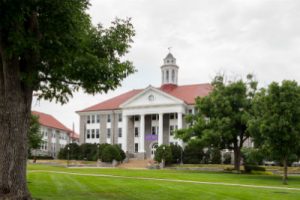
Summer is almost here and a labor shortage keeps employers looking to hire in the United States.
WalletHub’s 2023’s Best Places for a Summer Job helps job seekers find the best summer employment opportunities in the country. The personal finance website compared more than 180 markets across 21 key metrics. Data includes median income of part-time workers, availability of summer jobs and the commuter-friendliness of jobs.
Five cities in the Commonwealth made the list: Richmond at no. 22, Virginia Beach at no. 46, Chesapeake at no. 73, Norfolk at no. 115 and Newport News at no. 142. Washington, D.C. is in the latter half of the list at no. 126.
The no. 1 place for a summer job is Orlando, followed by Scottsdale, Ariz., Juneau, Alaska, Warwick, R.I. and Rapid City, S.D.
The worst places for summer jobs are Jackson, Mississippi, Laredo, Texas, Columbus, Georgia, Memphis and Baton Rouge.
The most part-time jobs per 1,000 individuals aged 16 to 24 are in Orlando and the fewest are in New York.
Median income for part-time workers is the highest in Scottsdale, Ariz. at $30,334, which is 3.4 times higher than in Burlington, Vermont, the city with the lowest at $8,894.
The highest labor-force participation of Americans aged 16 to 24 is 86.74 percent in South Burlington, Vermont, which is 2.2 times higher than in Irvine, Calif. the city with the lowest at 38.86 percent.
The lowest unemployment rate for Americans aged 16 to 24 is 4.36 percent in Madison, Wis., 6.4 times lower than in Detroit, where the rate is 27.73 percent.
Experts offered tips for young American searching for a summer job or internship.
“You need to do your research! Find out all that you can about the organization, the nature of the work, the duties and expectations. You want to walk in with eyes wide open,” Dr. José F. Rodríguez, Industrial-Organizational Psychologist, Associate Teaching Professor and Director of Master of Organizational Sciences Program at Florida International University, said. “You will want to cast a wide net, do not put all your eggs in one basket, as the saying goes. Also, do not forget to tap into your social network, talk to friends, colleagues, and parents, and ask them to ask around. Word of mouth and employee referrals are still tried and true ways of finding job and internship opportunities. Make sure that your LinkedIn profile is crisp and clean…Do not oversell yourself; focus on the knowledge, skills, and abilities that truly reflect reality, not some image of what you think the employer is looking for. Make sure that you have a set of questions to ask them when you go for the interview…Do not walk away with the feeling of not knowing exactly what you will be doing…Finally, do not take the first offer you get. You will want to make sure that you look carefully at the job task and duties to make sure that they align with what you want to develop.”
Chris Altizer is an adjunct lecturer and facilitator at Florida International University Center for Leadership. He said that the good news is unfilled jobs are available, but the bad news is employers have reasons for not filling them.
“First, be intentional about searching for a summer gig — decide in May what, where, when and why you want a job so that in June you get hired. Are you focused just on hours and wages, or would you trade some of that for learning something new or different? Would you tolerate a long commute or even temporarily relocate, or will you only work from home? Are you working because you want to or because you have to? What could you learn from volunteering this summer rather than taking a paying job? These questions have no right answers, but they do require your answer or you will take a job in June that you will quit in July. Second, there are people you know who can connect you to summer work opportunities – you just do not know who they are…When you are looking for work — for summer or career — do not wait for the internet or posted jobs. Everyone in the talent acquisition space knows that the best opportunities are not posted but are filled by networking. Best advice — tell everyone you know — everyone — that you are looking for work and why,” Altizer said.
According to Rodriguez young Americans make the mistake of not taking their job search seriously.
“Just because it is a summer gig does not diminish its purpose: allowing you to learn new skills and/or refine existing ones. Even though the summer job/internship may not turn into full-time employment, a common mistake many young people make is not taking it seriously and failing to pounce on the opportunity laid out in front of them. Despite its short duration, a summer job/internship can pack a lot of punch, especially if given the opportunity to learn something new,” Rodriguez said.
Professor E. Christi Cunningham, director of the Education Law Institute at Howard University School of Law, said that regardless of the reason for working, youth should first avoid staying in their comfort zone.
“Summers before graduation are some of the best times for young people to explore interests that they might not have been aware of. If a young person loves one thing, try looking at websites of companies that operate in a somewhat different but related field. Or try working in a completely different field. Summer is a great time to explore and grow. 2) focusing only on what they are doing. No matter what kind of summer job/internship a young person has, how they do the job is just as important as what job they are doing. Learning about professionalism, teamwork, healthy work relationships, and doing their best at whatever they do are just as essential to getting the most out of the summer experience,” Cunningham said.
Rodriguez said youth will be best equipped for their future if they have the right mindset and a willingness to learn new things.
“The fast changes in technology require that young people be agile in their learning. Take for example the explosive effects of ChatGPT and similar AI. Young people need to be willing to learn about how this technology functions, what are the drawback[s], and where the potential lies. Therefore, jobs/internships that will expose them to different experiences that then build their skills will be vital. The type of job/internship may not matter as much as the mindset that a person has toward learning and building their skills. So, despite the job/internship type, one needs to take an honest look at one’s knowledge, skills, and abilities. Know your strengths and know your deficits. The best job/internships will be those who are willing to help develop those deficit areas and also allow young people to refine their strengths as well,” Rodriguez said.
Atlizer said jobs are changing fast in the U.S. and focusing on job-specific values has lost value, except in the trades.
“While summer gigs typically involve more repetitive tasks — whether making copies or cutting the grass — the question is, what can you learn and practice that is valued anywhere? What can you learn about working well in teams, prioritizing work, about adapting to change? What can you learn about communicating with an angry customer or difficult coworker? The key word in these examples is ‘learn.’ In younger people, employers value learning agility — how quickly and well a person learns and applies what is needed to be successful right now. Learning agility is a trait and a skill that you can develop — but no one’s going to send you to class for it. What kinds of jobs will best equip you? The kind that gives you opportunities to learn something you do not know — even if that thing is how to get through a monotonous summer gig with grace and a sense of humor. Any and every job has that potential — and so do you,” Altizer said.










